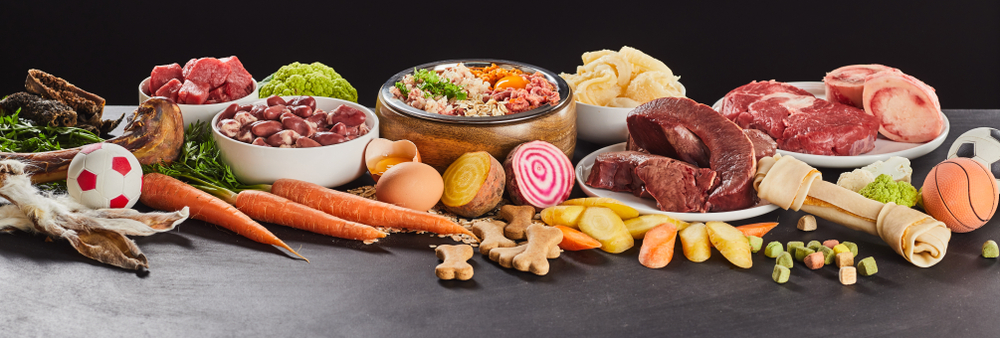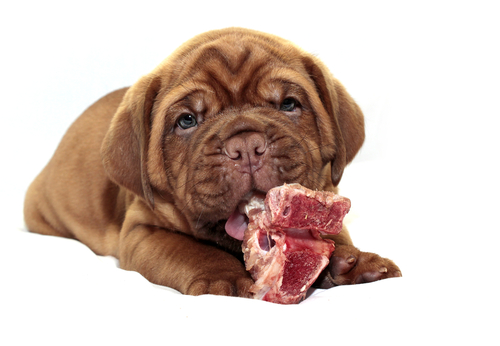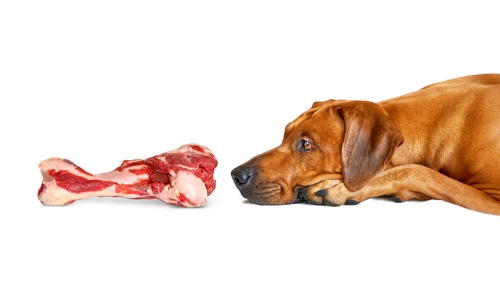As a responsible pet parent, you may often wonder if raw bones for dogs are a good idea.
The image of dogs chomping on large, juicy bones is iconic. But just how safe are raw bones for dogs?
Although raw bones have been a part of dogs’ diets for centuries, there seems to be a lot of conflicting information concerning their safety and benefits.
In this article, we’ll take a closer look at the topic of raw bones for dogs and their benefits so you can understand just how safe raw bones for dogs are.
Are Raw Bones Safe for Dogs?
Raw bones are generally safe for dogs to consume in moderation, just like most raw foods. In fact, they form a crucial part of your pet’s diet. They’re a great source of protein, minerals, and other essential nutrients and can also help boost your pup’s digestive system.
Besides, dogs love to chew and nibble on things. And raw bones work as the perfect chew toy while also providing various health benefits! Speaking of bones, Mighty Munch knows a thing or two about what are need to keep your dogs bones and joints healthy.
So, are raw bones good for dogs? Yes! But that doesn’t mean you should give them raw bones every day — once or twice a week will be perfect.
It’s also important to choose the right type of bone based on your dog’s size and breed. You should also always supervise your dog when giving them bones to prevent choking hazards.
“It’s important to choose the right size and type of bone for your dog. Bones that are too small or brittle can easily break and cause choking or other injuries.” — PetMD
It’s also best to only give your dog fresh raw bones, not frozen ones. Frozen bones are hard and can break. Frozen raw bones for dogs thus pose a risk of injury and choking hazard.
This is also true for cooked bones. If you’re confused between raw or cooked bones for dogs, remember that while raw bones are safe, cooked bones are not. Cooked bones break down easily and the splinters can cause injuries to your dog’s mouth, throat, or internal organs.
“Cooked bones should never be given to dogs, as they can splinter and cause blockages or other internal injuries. Stick to raw bones for your pet’s safety.” — The Spruce Pets
Additionally, always consult with your veterinarian before introducing new foods into your dog’s diet to ensure that they are getting a balanced and nutritious diet.
Benefits of Raw Bones for Dogs

Raw bones are great for your dog’s diet. Here are some major benefits that will boost your four-legged friend’s overall health:
Natural Teeth Cleaning
Chewing on bones helps scrape away plaque and tartar buildup, which can reduce the risk of dental problems such as gum disease and tooth decay. It’s a natural alternative to commercial dental chews or toothbrushing, which can be stressful for some dogs.
Gnawing on raw bones will not only give your dog something to nibble on but also help maintain its oral health by stimulating saliva enzymes. Give your dog a raw bone to chew on once a week, and you might end up saving on costly dental procedures in the future!
Nutritional value
Raw bones are also an excellent source of essential nutrients such as calcium, phosphorus, and magnesium, which can boost bone health, muscle function, and overall well-being.
“Raw bones can provide important minerals and nutrients for dogs, including calcium, magnesium, and phosphorus, which are essential for maintaining strong bones and teeth.” — Pets WebMD
These minerals are often lacking in commercial dog food, which makes raw bones — especially juicy bones with some meat attached — a valuable addition to your dog’s diet. This is also why between cooked or raw bones for dogs, you should always choose raw bones. Cooked bones are not only unsafe but have also lost their nutritional value in the cooking process.
And remember that while raw bones can provide some nutritional value, they should not replace a balanced diet including fresh fruits and veggies. If you’re confused about can dogs eat kiwi, carrots, or beans or even how often to give your dog raw bones, consult with your veterinarian to create a proper meal plan based on your pup’s individual nutritional needs.
Mental Stimulation
Giving your furry friend a raw bone to chew on is also a tasty way to keep it entertained and engaged, especially when you have to leave your pup alone for a while.
Lack of mental stimulation can often make dogs destructive. And chewing is a self-soothing behavior that releases endorphins, which can help your dog feel calm and content. Chewing on bones can thus provide mental stimulation for dogs and help relieve their stress and boredom.
The Best Types of Raw Bones for Dogs

Large, sturdy, and digestible bones are some of the best raw bones for dogs. Here are some examples of raw bones your pup can safely munch on:
Beef Knuckle Bones
Are raw beef bones safe for dogs? Yes! Beef knuckle bones are large, sturdy bones that are perfect for aggressive chewers. These bones are covered in cartilage and contain marrow and meat, making them an excellent source of nutrition for your furry friend.
It’s also important to make sure the beef knuckle bone is large enough to avoid the risk of choking. If you’re wondering whether to give beef bones for dogs raw or cooked, remember to always give your dog raw, uncooked bones, including beef bones.
Marrow Bones
Marrow bones are a favorite among dogs and are typically larger than beef knuckle bones. These bones are perfect for larger breeds as they provide a lot of chewing time and nutritional value.
The marrow inside these bones is packed with nutrients, such as calcium, phosphorus, and fat, all of which support bone growth and healthy skin and coat. Marrow bones can be particularly useful for puppies and senior dogs who require a more substantial source of nutrition.

Raw Chicken Wings
Raw chicken wings are small, lightweight, and easy for dogs to digest while providing a good source of nutrition, including protein and calcium. These bones are also a good option for smaller dogs or those with weaker jaws.
Chicken wings are also perfect for dental health as they help scrape plaque and tartar off your dog’s teeth.
Turkey Necks
Turkey necks are a favorite among dogs and provide a lot of chewing time. These bones are rich in calcium and phosphorus, which are essential for healthy bones and teeth. Apart from these nutritional benefits, turkey necks can also help promote a shiny coat and healthy skin.
Lamb Bones
Lamb bones are another great option for dogs, particularly those with allergies to beef or chicken. They are packed with nutrition, including vitamins and minerals such as calcium, phosphorus, and iron.
Lamb bones are also great for dental health, helping to keep your dog’s teeth clean and healthy.
The Takeaway
Raw bones are not only safe for dogs but also provide many health benefits, including natural teeth cleaning! However, they should be used as a supplement to a balanced diet to ensure your dog’s overall health and well-being.
Remember that every dog is different, so their dietary needs and tolerance of raw bones will also differ. Consult with your veterinarian before introducing raw bones into your dog’s diet.





